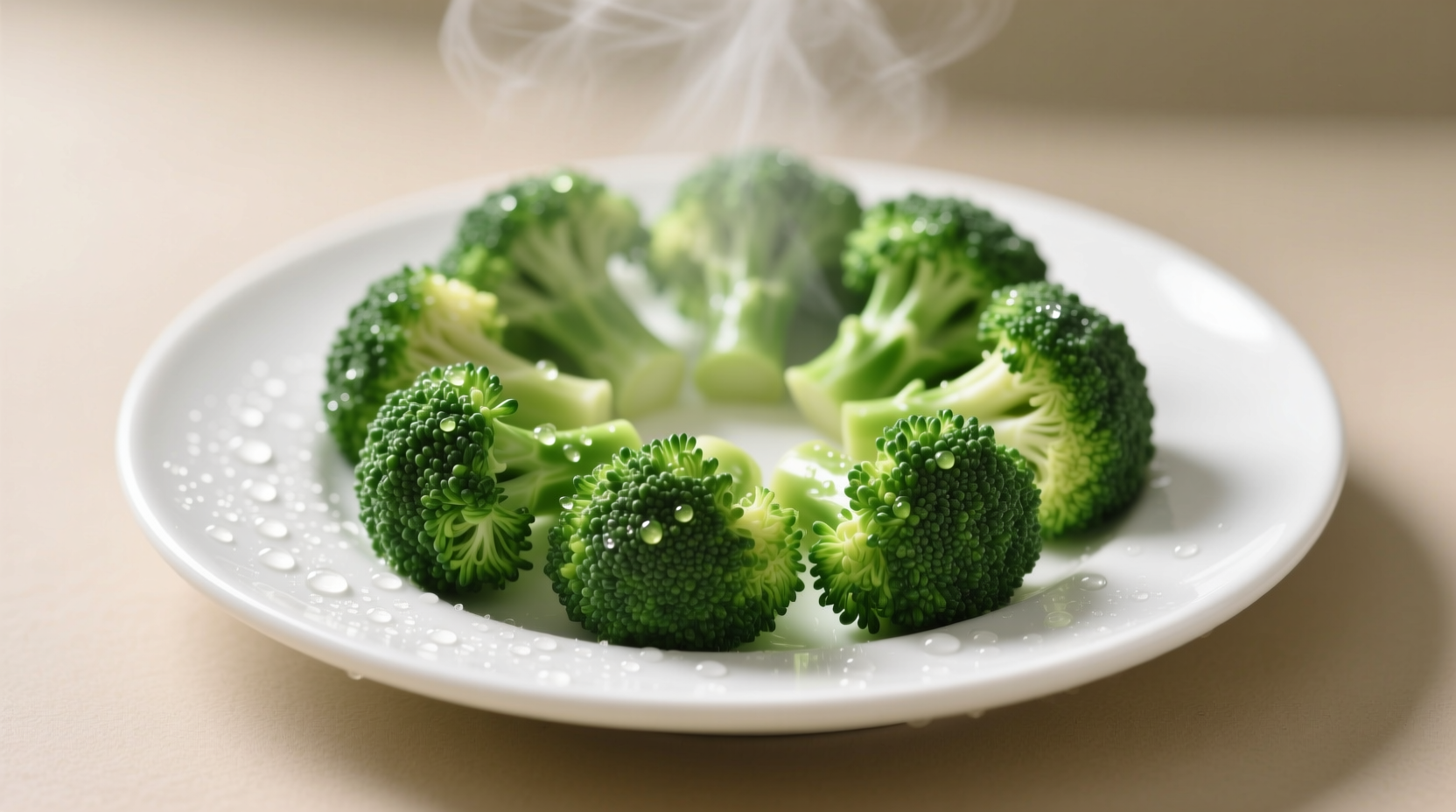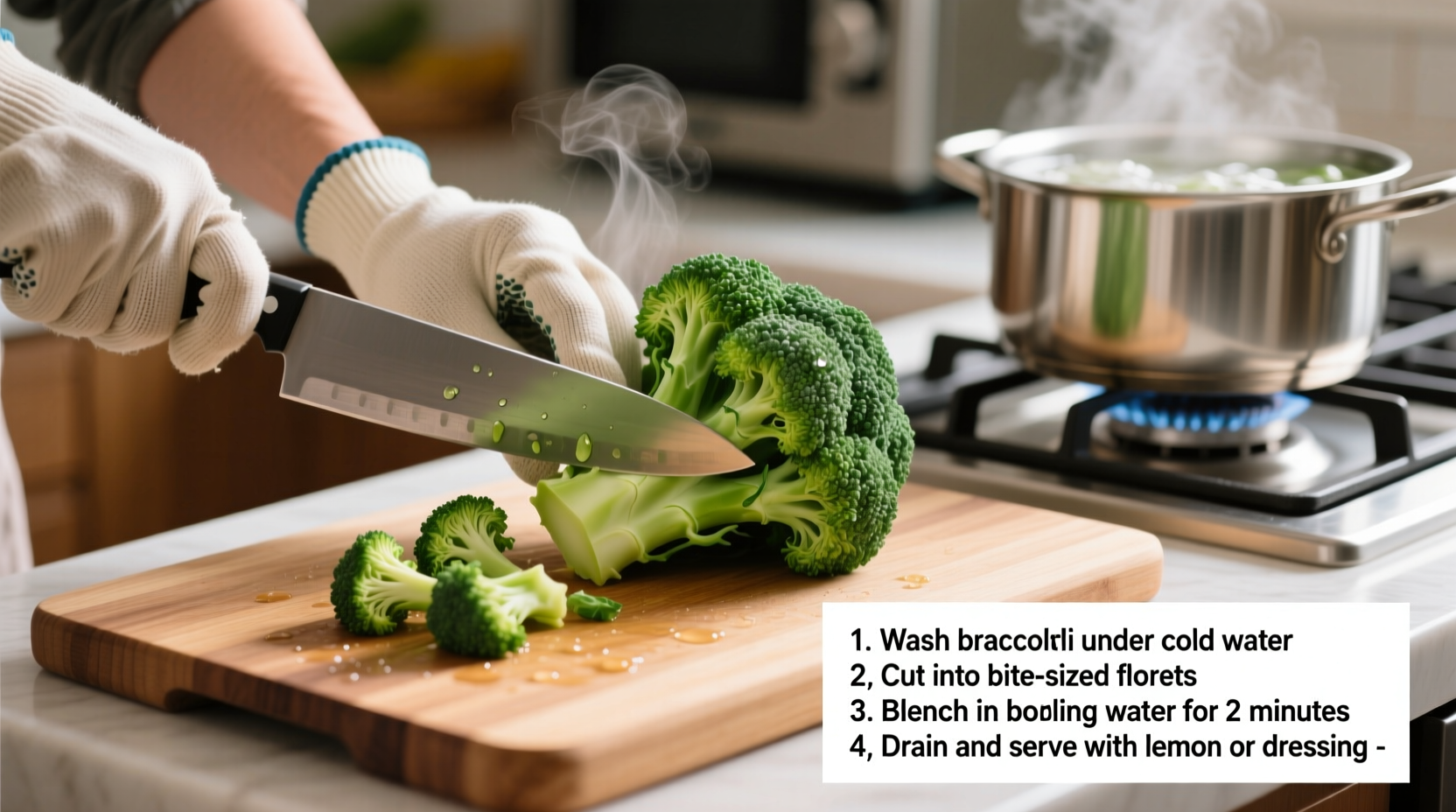Broccoli transforms from a potentially bitter raw vegetable into a culinary delight when cooked properly. As a professional chef with years of experience teaching home cooks, I've discovered that most people struggle with broccoli because they don't understand how different cooking methods affect its texture, flavor, and nutritional value. This guide reveals five chef-approved techniques that guarantee perfect broccoli every time—plus the science behind why they work.
Why Cooking Method Matters for Broccoli
Broccoli contains sulforaphane, a powerful antioxidant that's most bioavailable when cooked properly. According to research from the USDA Food Data Central, different cooking methods affect nutrient retention differently. Overcooking destroys valuable compounds while undercooking leaves broccoli unpleasantly tough. The key is understanding how heat interacts with broccoli's cellular structure.
Steaming: The Nutrient-Preserving Champion
Steaming maintains the highest nutrient levels while creating perfectly tender-crisp broccoli. This method works by using vapor heat rather than direct water contact, preventing water-soluble vitamins from leaching out.
Step-by-Step Steaming Guide
- Trim broccoli into uniform florets (about 1.5 inches)
- Add 1 inch of water to a pot with a steamer basket
- Bring water to a rolling boil
- Add broccoli and cover immediately
- Cook for 3-5 minutes until bright green and fork-tender
- Remove immediately and shock with cold water if not serving right away
Pro tip: Add a pinch of salt to the water—not the broccoli—to enhance flavor without drawing out moisture. For restaurant-quality results, finish with a squeeze of lemon and a sprinkle of flaky sea salt.

Roasting: The Flavor Transformer
Roasting caramelizes broccoli's natural sugars, creating complex flavors that make even broccoli skeptics converts. The Maillard reaction (browning process) develops hundreds of new flavor compounds.
Perfect Roasted Broccoli Technique
- Preheat oven to 400°F (200°C)
- Toss florets with 1 tbsp high-smoke point oil (avocado or grapeseed)
- Spread in single layer on parchment-lined baking sheet
- Roast 20-25 minutes, flipping halfway
- Finish with squeeze of lemon and optional garlic powder
Crispiness control: For extra-crispy edges, increase temperature to 425°F and reduce cooking time by 3-5 minutes. Larger florets need 25-28 minutes while smaller pieces cook in 18-20 minutes.
Sautéing: The Speed Demon
Sautéing delivers restaurant-quality broccoli in minutes. The direct high-heat contact creates a delightful contrast between tender interiors and slightly crisp exteriors.
Professional Sauté Method
- Heat 1 tbsp oil in cast-iron or carbon steel pan until shimmering
- Add broccoli florets in single layer (crowding causes steaming)
- Cook undisturbed for 2 minutes to develop sear
- Stir and continue cooking 2-4 minutes until tender-crisp
- Add 2 tbsp water, cover immediately to steam-finish if needed
This technique works best with smaller florets. For enhanced flavor, add minced garlic during the last 30 seconds of cooking—any earlier and it will burn.
Blanching: The Salad & Freezing Secret
Blanching briefly cooks broccoli while preserving its vibrant color and crisp texture—essential for salads or freezing.
Perfect Blanching Ratio
| Water Volume | Salt | Broccoli | Time |
|---|---|---|---|
| 4 quarts | 2 tbsp | 1 lb | 2-3 minutes |
| 6 quarts | 3 tbsp | 1.5 lbs | 2.5-3.5 minutes |
Immediately transfer to ice water bath for same duration as cooking time. This stops the cooking process while maintaining perfect texture. Pat completely dry before storing or using in salads.
Microwaving: The Emergency Method
When time is critical, microwaving can produce decent results if done properly. This method works best for single servings.
- Place florets in microwave-safe dish
- Add 2 tbsp water
- Cover tightly with vented plastic wrap
- Microwave on high for 3-4 minutes
- Let stand 1 minute before uncovering
Warning: Over-microwaving creates sulfurous odors and mushy texture. Never microwave dry—the small amount of water creates essential steam for even cooking.
Nutrient Retention Comparison
Research from the National Center for Biotechnology Information shows significant differences in nutrient preservation:
| Cooking Method | Vitamin C Retention | Sulforaphane Availability | Best For |
|---|---|---|---|
| Steaming | 85-90% | High | Nutrient-focused meals |
| Roasting | 60-70% | Moderate | Flavor-focused dishes |
| Sautéing | 70-75% | High | Quick weeknight meals |
| Blanching | 75-80% | Moderate | Salads and freezing |
| Microwaving | 65-75% | Low | Emergency situations |
Common Broccoli Cooking Mistakes
Avoid these pitfalls that ruin perfectly good broccoli:
- Overcrowding the pan - causes steaming instead of searing
- Adding salt directly to broccoli - draws out moisture and creates mush
- Cooking stalks and florets together - stalks need 2-3 minutes longer
- Using low smoke-point oils - creates bitter flavors when roasting
- Skipping the acid finish - lemon or vinegar balances bitterness
Flavor Enhancement Guide
Elevate your broccoli with these chef-recommended combinations:
Classic Pairings
- Lemon zest + garlic + extra virgin olive oil
- Parmesan cheese + toasted pine nuts
- Balsamic glaze + fresh thyme
Global Flavor Profiles
- Asian: Toasted sesame oil + rice vinegar + red pepper flakes
- Mediterranean: Lemon juice + oregano + kalamata olives
- Mexican: Lime juice + cilantro + cotija cheese
Storage and Reheating Tips
Properly stored cooked broccoli maintains quality for 3-4 days:
- Store in airtight container with paper towel to absorb moisture
- Reheat in oven or air fryer (350°F for 5-7 minutes) for best texture
- Avoid microwaving leftovers—it creates uneven texture
- Freeze blanched broccoli for up to 12 months
Revive slightly limp broccoli by plunging into boiling salted water for 30 seconds, then shocking in ice water.
Broccoli Cooking Timeline Evolution
Understanding how cooking time affects texture helps prevent overcooking:
- 0-2 minutes: Raw texture, bright green, slightly bitter
- 2-4 minutes: Crisp-tender, vibrant color, mild bitterness
- 4-6 minutes: Tender-crisp, fully developed flavor, no bitterness
- 6-8 minutes: Soft texture, muted color, some nutrient loss
- 8+ minutes: Mushy, dull color, sulfurous odor, significant nutrient loss
The ideal window for most cooking methods is the 4-6 minute range where broccoli achieves perfect tenderness while maintaining nutritional value and vibrant color.











 浙公网安备
33010002000092号
浙公网安备
33010002000092号 浙B2-20120091-4
浙B2-20120091-4